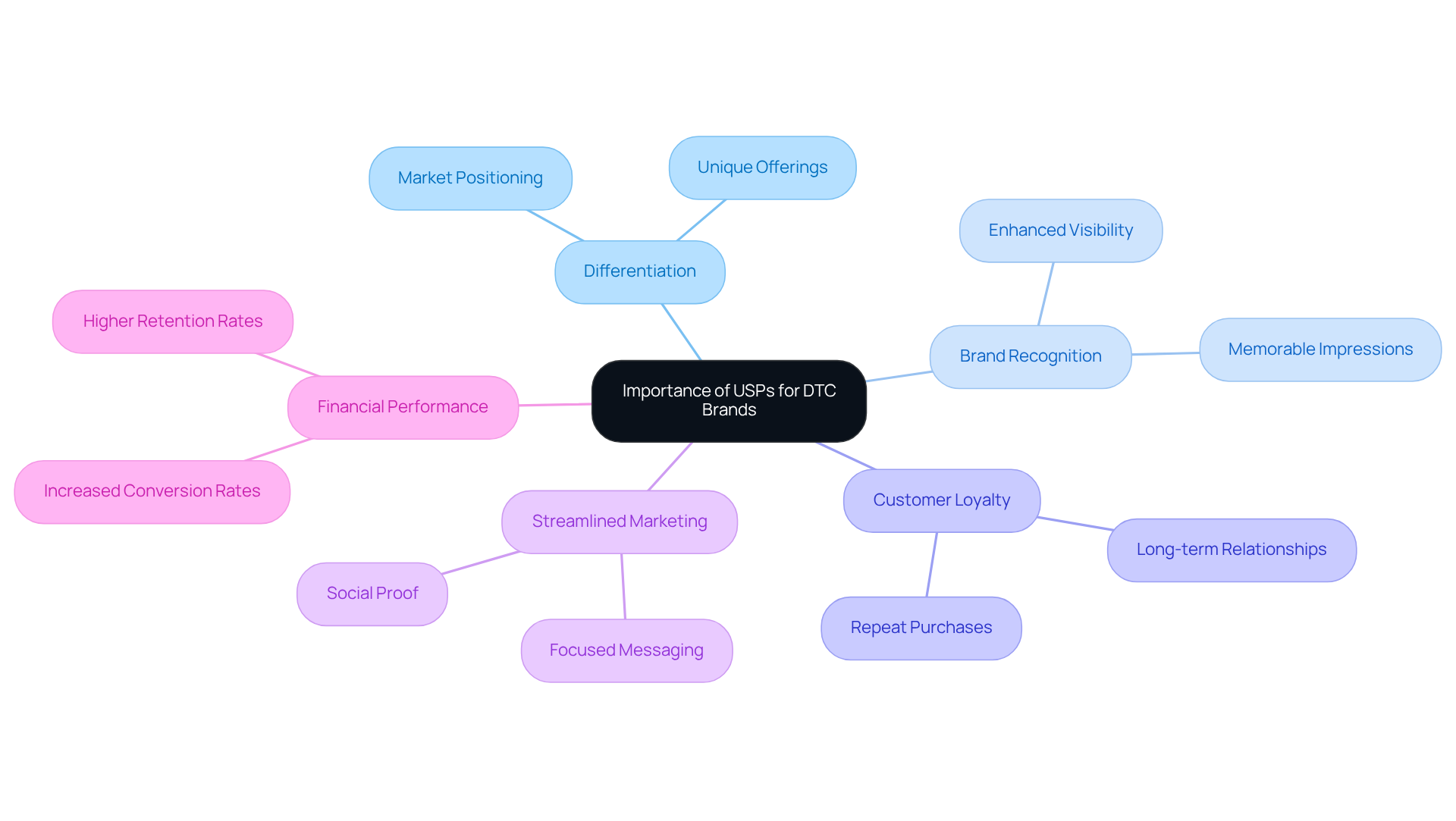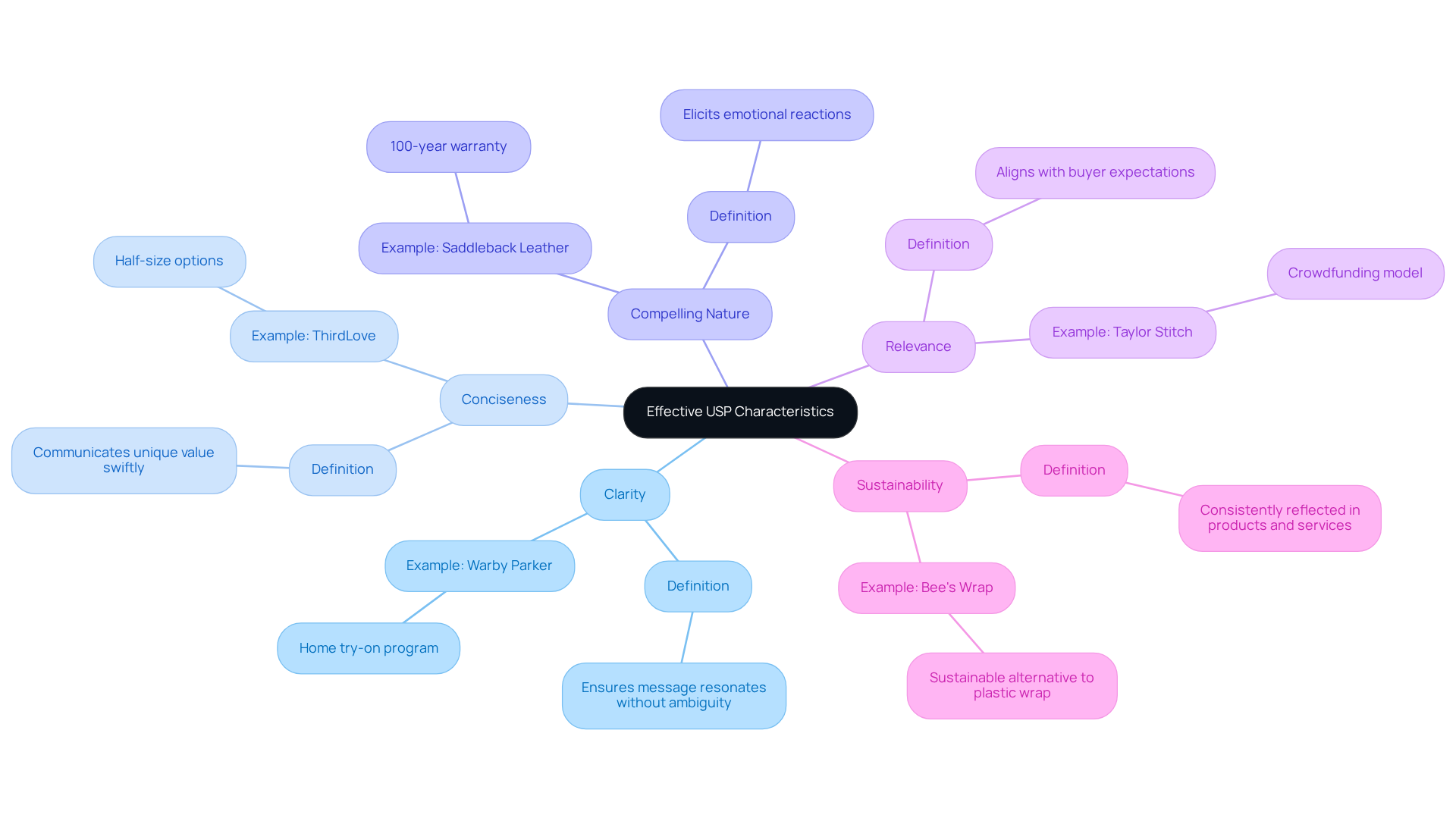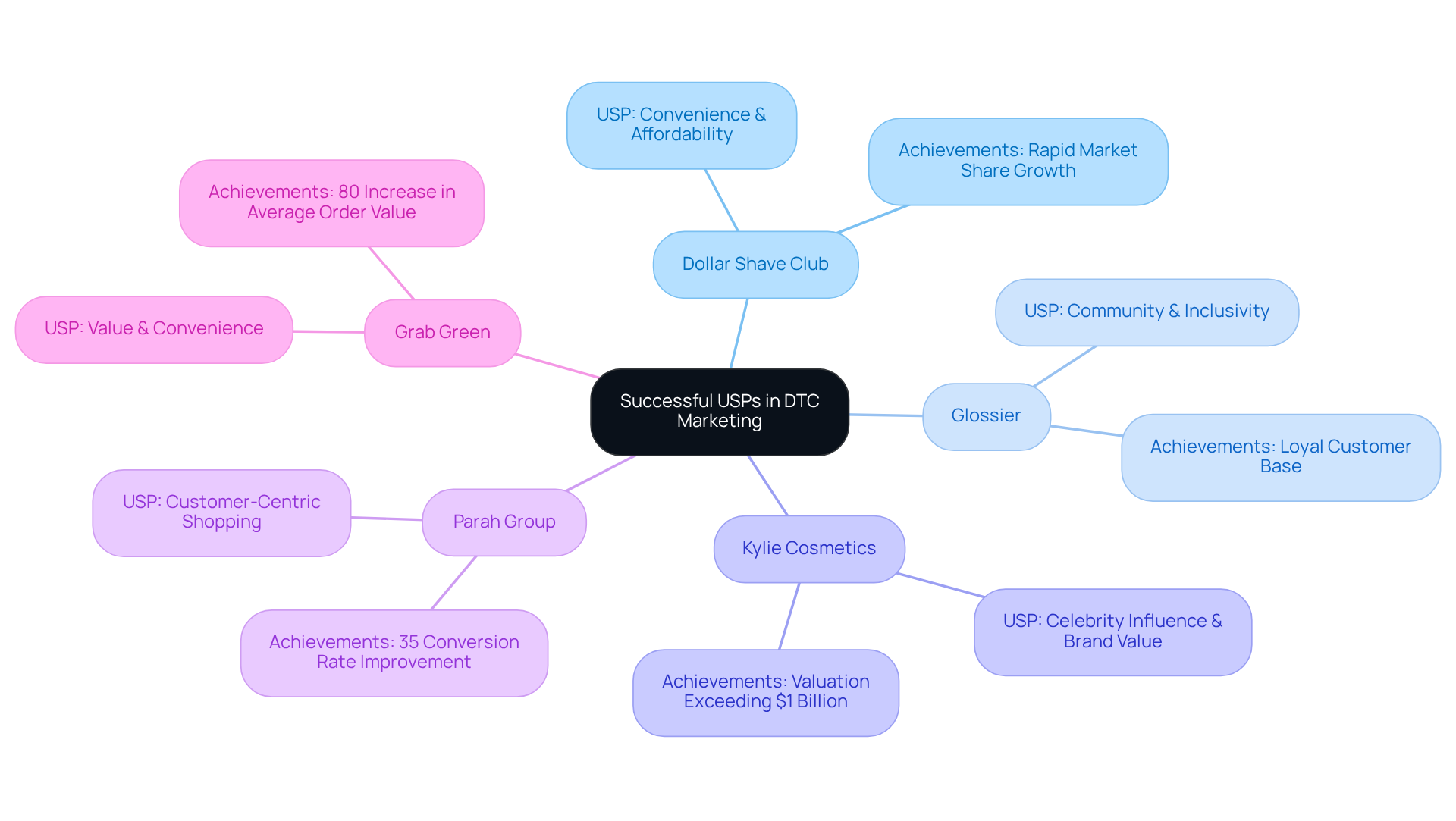
Overview
The article emphasizes the critical role of Unique Selling Propositions (USPs) in the success of direct-to-consumer (DTC) brands. A well-defined USP is not merely advantageous; it is essential for DTC companies aiming to distinguish themselves in an increasingly saturated market. By effectively capturing consumer attention, a strong USP fosters loyalty and significantly enhances marketing effectiveness. This assertion is supported by the success stories of brands such as Warby Parker and Dollar Shave Club, which have leveraged their USPs to achieve remarkable market presence.
In conclusion, DTC brands must prioritize the development of a compelling USP to thrive in today's competitive landscape.
Introduction
In a marketplace overflowing with choices, the imperative for direct-to-consumer (DTC) brands to distinguish themselves has never been greater. The Unique Selling Proposition (USP) acts as a beacon of differentiation, effectively articulating the distinct value a brand brings to its customers. This article examines the critical role of USPs, illustrating how they not only capture consumer attention but also cultivate loyalty and influence purchasing decisions. Given the multitude of brands competing for consumer interest, the question arises: what truly makes a USP compelling enough to penetrate the clutter and resonate with today's discerning shoppers?
Define Unique Selling Proposition (USP) in Marketing
A Unique Selling Proposition (USP) marketing strategy is the defining characteristic or benefit that distinguishes a product from its competitors in USP marketing. It serves as a clear statement that articulates the unique value a company provides to its customers, addressing their specific needs or pain points. The concept of USP, popularized by advertising pioneer Rosser Reeves in the 1940s, underscores the necessity of differentiation in a saturated marketplace. For direct-to-consumer (DTC) companies, USP marketing is essential for attracting attention and fostering loyalty, as it concisely conveys why a customer should select one company over another.
In today's competitive environment, many DTC companies effectively leverage USP marketing to distinguish themselves. Companies such as Warby Parker and Allbirds serve as prime examples, successfully emphasizing their distinct products—affordable eyewear and sustainable footwear, respectively—fostering a strong emotional bond with customers. This differentiation is essential, particularly as only 17% of Americans believe that purchasing from a DTC company provides something unique compared to conventional retail companies.
The significance of a compelling USP marketing strategy cannot be overstated; it not only stimulates interest but also influences purchasing decisions. With 40% of shoppers citing complimentary delivery as a key motivator for purchases and 51% desiring simple returns, DTC companies must ensure their unique selling propositions resonate with these expectations. Parah Group emphasizes that a robust USP can significantly enhance Conversion Rate Optimization (CRO) efforts, leading to sustainable profitability and growth. By distinctly outlining and conveying their unique selling propositions through USP marketing, companies can enhance their positioning to succeed amid rising competition and evolving consumer behaviors. As noted by industry experts, "the most intelligent companies out there are those that are not optimizing for each channel separately but are optimizing for balanced success across the full funnel." Furthermore, Parah Group distinguishes itself from other CRO agencies by focusing on profitability and sustainable growth, ensuring that strategies are customized to address the unique requirements of DTC companies.

Explain the Importance of USPs for DTC Brands
For direct-to-consumer (DTC) companies, a strong USP marketing strategy is crucial for numerous persuasive reasons. It serves as a vital differentiator in a crowded marketplace, where shoppers face an overwhelming array of choices. A well-crafted USP not only captures attention but also fosters a memorable impression, significantly enhancing brand recognition. Furthermore, a clearly defined USP resonates with the values and needs of the target audience, thereby bolstering customer loyalty. When consumers engage with a company's unique offerings, they are more inclined to make repeat purchases, cultivating long-term relationships.
Moreover, a strong USP marketing approach streamlines marketing efforts by enabling companies to focus their messaging on what genuinely matters to their audience. This focused approach enhances the effectiveness of marketing campaigns and drives higher conversion rates and profitability. For instance, Parah Group has successfully transformed DTC product profitability through innovative Conversion Rate Optimization (CRO) strategies. In one case study, a $30M apparel company observed a 35% rise in conversion rates after employing strategies that emphasized social proof and optimized product pricing. This demonstrates how a strong USP marketing can work in tandem with effective CRO to enhance overall performance.
Data supports the correlation between strong USPs and customer loyalty, indicating that companies with clear, compelling propositions tend to enjoy higher retention rates. For example, Birkenstock reported that direct-to-consumer sales accounted for 37% of its total revenue, up from 34% the previous year, showcasing the impact of a strong USP on financial performance. Expert opinions further affirm that a well-articulated USP marketing strategy is not merely a marketing tool but a foundational element that can significantly influence a DTC company's success in today's competitive landscape.

Identify Key Characteristics of an Effective USP
A strong Unique Selling Proposition (USP) embodies several critical characteristics: clarity, conciseness, and a compelling nature. Clarity is paramount, as it ensures the message resonates with the target audience without ambiguity. Conciseness allows brands to communicate their unique value swiftly, capturing attention in a crowded marketplace. Moreover, a persuasive USP should elicit an emotional reaction, creating a stronger bond with customers by meeting their particular needs and wants. Research indicates that emotional responses to USPs can significantly influence buyer behavior, making USP marketing a crucial aspect for effective marketing. Relevance to the target market is essential, as it ensures the USP aligns with buyer expectations and preferences. Lastly, sustainability is vital; a strong USP must be consistently reflected in the brand's products, services, and overall customer experience.
For example, Warby Parker illustrates these characteristics with its unique selling proposition of providing fashionable eyewear at a reasonable cost, enhanced by a socially responsible business model that appeals to individuals looking for both value and ethics in their purchases. Similarly, ThirdLove's focus on providing half-size options and a perfect fit promise addresses a common pain point in the lingerie market, while Saddleback Leather emphasizes longevity with its 100-year warranty, appealing to consumers who value durability.
Examining competitors' marketing messages is also crucial in establishing USP marketing, as it assists companies in identifying market gaps and enhancing their positioning. As observed by marketing specialists, "Many companies owe much of their current success to the time and financial resources they invested in developing their USP.

Provide Examples of Successful USPs in DTC Marketing
Numerous DTC companies have effectively harnessed their unique selling propositions (USPs) to achieve remarkable growth. For example, Dollar Shave Club's USP centers on convenience and affordability, delivering high-quality razors directly to consumers at a fraction of conventional retail prices. This compelling proposition resonates with consumers, leading to swift adoption and a substantial rise in market share.
Similarly, Glossier has carved out its niche by emphasizing community and inclusivity within its USP, actively encouraging customers to participate in the narrative of the company. By prioritizing real beauty and soliciting customer feedback, Glossier has cultivated a loyal customer base and experienced impressive sales growth.
These cases underscore the essential role that USP marketing plays in distinguishing a product, enhancing customer engagement, and driving loyalty. Furthermore, statistics reveal that DTC companies with strong USPs are witnessing significant growth, with over 110,000 DTC enterprises currently operating in the United States. This trend underscores the increasing importance of USP marketing within the competitive landscape of direct-to-consumer marketing.
Additionally, companies like Kylie Cosmetics, which achieved a valuation exceeding $1 billion in March 2023, exemplify how powerful USPs can lead to substantial market success. Parah Group's case studies further illustrate this point; for instance, a $30M apparel label improved its conversion rate by 35% and revenue per visitor by 10% through strategic homepage redesigns and gamified shopping experiences, directly enhancing its USP of customer-centric shopping.
Likewise, Grab Green, a $15M cleaning product brand, experienced an 80% increase in average order value by implementing bundles and optimizing pricing strategies, thereby reinforcing its USP of value and convenience.
These examples demonstrate how integrating robust USPs with innovative CRO strategies and USP marketing can significantly enhance profitability and drive growth, particularly as consumers increasingly prioritize sustainability and social responsibility.

Conclusion
A Unique Selling Proposition (USP) transcends its role as a mere marketing tool; it stands as the cornerstone of a successful direct-to-consumer (DTC) strategy. By articulating what distinguishes a brand from its competitors, a meticulously crafted USP becomes indispensable for attracting and retaining customers within an increasingly saturated marketplace. This differentiation not only cultivates brand loyalty but also stimulates repeat purchases, ultimately propelling long-term success for DTC companies.
Throughout this article, we have elucidated key insights into the pivotal role of USPs in bolstering brand recognition and enhancing customer engagement. Illustrative success stories from brands such as Warby Parker, Glossier, and Dollar Shave Club exemplify how a robust USP resonates with consumers, fostering substantial market growth. Furthermore, we have underscored the essential characteristics of an effective USP—clarity, conciseness, emotional appeal, and relevance—as critical components that enhance a brand's efficacy in the DTC landscape.
In conclusion, the importance of a well-defined USP cannot be overstated. As competition intensifies and consumer preferences shift, DTC brands must prioritize the development and communication of their unique selling propositions. By doing so, they not only strengthen their market positioning but also cultivate enduring relationships with their customers. Embracing the principles articulated in this article can empower brands to adeptly navigate the challenges of the contemporary marketplace and achieve sustainable growth.
Frequently Asked Questions
What is a Unique Selling Proposition (USP) in marketing?
A Unique Selling Proposition (USP) is a defining characteristic or benefit that distinguishes a product from its competitors. It articulates the unique value a company provides to its customers, addressing their specific needs or pain points.
Who popularized the concept of USP and when?
The concept of USP was popularized by advertising pioneer Rosser Reeves in the 1940s.
Why is USP marketing important for direct-to-consumer (DTC) companies?
USP marketing is essential for DTC companies as it helps attract attention and foster customer loyalty by clearly conveying why a customer should choose one company over another.
Can you provide examples of companies that effectively use USP marketing?
Companies like Warby Parker, which offers affordable eyewear, and Allbirds, known for sustainable footwear, are prime examples of DTC companies that effectively emphasize their unique products through USP marketing.
What percentage of Americans believe purchasing from a DTC company offers something unique compared to conventional retail?
Only 17% of Americans believe that purchasing from a DTC company provides something unique compared to conventional retail companies.
How does a compelling USP influence consumer behavior?
A compelling USP stimulates interest and influences purchasing decisions, with 40% of shoppers citing complimentary delivery and 51% desiring simple returns as key motivators for purchases.
How can a robust USP enhance Conversion Rate Optimization (CRO) efforts?
A robust USP can significantly enhance CRO efforts by clearly outlining and conveying unique selling propositions, leading to sustainable profitability and growth for companies.
What approach does Parah Group take in its strategies for DTC companies?
Parah Group focuses on profitability and sustainable growth, ensuring that its strategies are customized to address the unique requirements of DTC companies rather than optimizing for each channel separately.
FAQs











